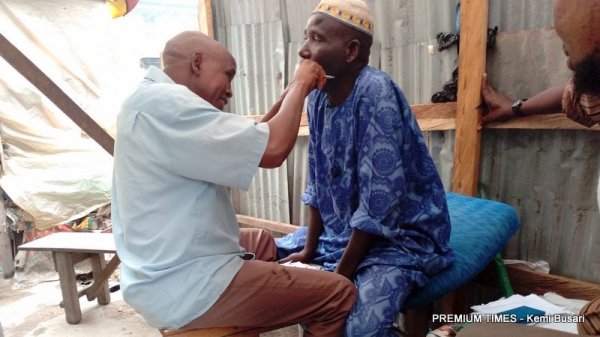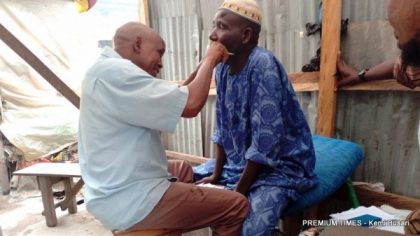Features
Inside dazzling world of razor-using Hausa barbers

By ADEBAYO OBAJEMU
In spite of modernisation of barbing business with modern gadgets of removing beards and barbing hair, some practitioners have stuck to the traditional barbing method, especially people of northern extraction. A visit to areas, such as Obalende, Ijora Badia, Agege, Ketu and others where we have large Hausa/ Fulani community, will give one an inkling of the resilience of traditional barbing.
Take a case of Hamzat Abdullahi, 62, who hails from Bauchi, his belief is that there is no gadget that can remove hair with such potency as the razor. He said he has been a barber for more than forty years. As he spoke to this reporter, he concentrated on shaving frayed hair off Tunji Jones’s chin to earn another 100, the sixth for the day.
He hummed a song that seemed like a catalyst while carefully depositing nauseating patches of damp hair on the dorsal side of his hand.
Ish! Jones suddenly made a sound – a signal Hamzat had to slow down. He had just been cut by the blade. Blood was out of his chin in an instant.
It’s a familiar scene to Hamzat .A triple glissade movement of his right hand on the affected area soon brought the flow to a low.
But the blood will not stop Hamzat from using blade another time, neither would it ever make him change to the use of clipper.
“I will never use clipper,” he declared. “Even if you visit the barber, they still use blade. The only difference is the way they have decided to shape the modern one (clipper). Everybody use blade.”
Hamisu from Kano has been a barber for as long as he remembers. At 52, he said he built his own mud house in his village in Kano from the proceeds of his barbing business. Married to two wives, all based in his village, he believes using razor is superior to applying clippers.
” My brother, clipper can not give you a clean shave ,but razor can do, to achieve ” gorimapa” effect ( bald shaving) , you must apply razor”, he said in a chat with this reporter.
Danladi, another barber ,who barbs hair in Obalende area, close to St. Gregory College agreed with Hamisu on the potency of using razor. The trio of Hamisu, Danladi and Hamzat are not aware of any infection they could contract through this means of head shaving.
Jones, who said he always patronises these razor – using barbers, does not even think of the risk of infection ,in spite of his education and status as a civil servant. Hear him:
“Hamzat doesn’t use one blade for two people and that gives me the confidence,” he said when asked the source of his confidence.
To their teeming customers, these razor- using barbers’ expertise and experience present themselves as enough shield against the possible contraction of diseases.
Twenty years ago, Danladi started the barbering business he found his father and other grownup males in his family doing.
“The process of starting was very simple. All I needed was blade, the handle, soap and water and this was readily provided by my family,” he started.
He not only enjoys many years of consistent practice, which started from Kano to Taraba and then Obalende in Lagos where he has been practising since the military regime of General Sani Abacha, but also takes ‘measures’ to ‘protect’ his customers.
The ‘measure’ exists in his long years of monotonous and metamorphosed practice.
The shaving process starts with the application of water on the hair of the customer after which soap is rubbed on the head to soften the path for the blade. For this stage, Danladi as others uses the same soap for every customer until it is finished. He uses purchased sachet water which he pours into a cup. He does these with his bare hands which he dries on a rag thereafter.
Then the scraping begins right from the middle of the head to the back, back to the middle, front, until the last hair is snipped off.
While the cutting continues, the pasty patches of hair are either dumped on a cleared plot on the head, on the dorsal part of his left hand or right on the barbing bench. Other patches make their way to the ground.
At the end of each shaving process, Mr Amzat either rubs cream on the head of his customers, spray methylated spirit or both; sometimes none. He repeats the process for as many customers as visit his make-shift shop in a day. He is confident of their safety.
“Sickness and its treatment come from God. I believe that even if there is an infection, it can’t threaten the life of the person involved. I’m aware that people can contract diseases through shaving.
What the experts say of Danladi and others’ method
A medical view says there is high risk of infection in the method applied by these barbers.
Danladi stated that he uses the handle for at least six months. He shaves up to 50 when business is good, and 20 when business is on the low. It then means that he uses a single blade handle for about 7, 200 at an average of 40 per day.
Dr. Kayode Ojikutu, a dermatologist who specialises in plastic surgery, said diseases can be transmitted through improper use and sterilisation of the handle.
“The handle has nothing to do with transmission but if they are using it and there is a cut on the person it could be dangerous. If that person (that was cut) has hepatitis or any other disease and the new blade cut a new person again, it can be transmitted if the handler is not well treated.”
These barbers using razor believe in the use of water for staying out of trouble in such situations but water will not do enough.
“ It is a joke of the century to think that water can clean it,” Ojikutu declared. “If the organism touches the sharp end and the other person using it now has another cut, that’s how you can transmit viruses and even regular organisms that stay on the skin.”
He further enlightened that the use of spirit as aftershave does not give as much protection as barbers think.
“Spirits basically can crystalise objects but not necessarily stop some viruses. There are some viruses that some specific temperatures have to exist to kill them but spirit can’t do this. Even at barbers shop, it doesn’t stop you from getting bumps. If you go to the salon and they applied it and it became pepperish you think you’re protected. It’s just psychology.”
With the arrival of the first electronic shaver in 1929, barbers all over the world bade good bye to the use of the razor for the most part of the 20th century, but not entirely.
While many made a successful transition to clippers, some still prefer to use knives, a shaving tool in vogue up till late 19th century and blades, which first came in a disposable form in 1895.
Majority of razor and knives faithful still exist in Nigeria; not only in rural areas but also in urban cities. This practice is common among the northern Hausa/Fulani tribe where some families have over the years passed the skill down to their generations.To be a commercial razor barber in Nigeria does not require formal training, certification or regulation.
“It’s a lineage business. Once your father or guardian sees you are coming of age, he would introduce it to you, transfer some of the equipment to you. You mustn’t reject if you don’t want the wrath of God. Once you embrace, the blessing of God will abide by you and the business,” says Sani , Hamisu’s Under Bridge neighbour. Hamisu dismissed suggestion of infection, saying :
“In the situation that someone has a cut, there is a medicine that my forefathers use. Once I rub it, by the grace of Allah, it will heal. We call it blood medicine,” he said. “From my experience, nobody has ever come to complain about contracting any disease. I believe in the medicine.”
Kolawole, is a banker with one of the banks in Lagos, but his passion is with razor- using barbers whom he patronises whenever there is a need to barb his hair. ” The thing is that their barbing is neat, unlike clippers which can not remove all of the hair.” When reminded of the risk, he laughed it off , saying ” spirit will not allow infection once it is properly applied.
Seni, a mechanic at Ijora bus stop said he prefer patronising Hausa barbers who use razor ,” because it is cheap, just N100, and very fast,no time to waste.”



